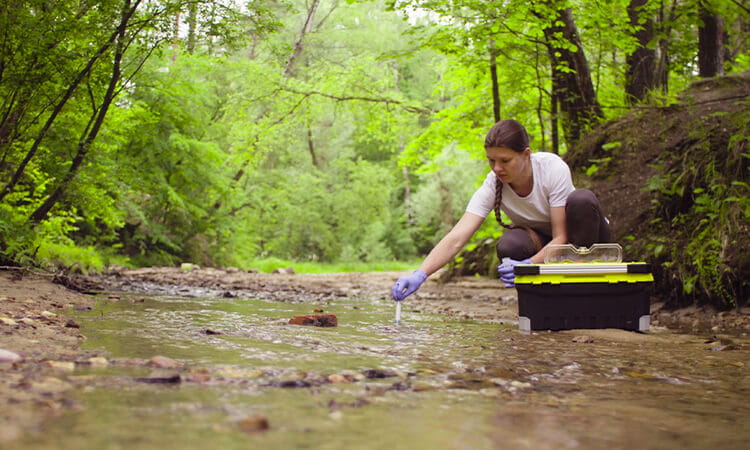What does an environmental scientist do?
Protect our animals, plants, natural resources and all the incredible aspects of our environment as an environmental scientist. A big part of this job is environmental research; from evaluating habitat and wildlife needs, to conducting environmental impact assessments, to analysing the effects of pollution. With this knowledge you can advise on policies and help enforce laws to conserve and protect the environment. Many environmental scientists work in the field and some work in corporate offices or educational settings, such as schools and universities.Is a career as an environmental scientist right for me?
When conducting environmental studies, it’s likely you’ll have to get up close and personal with nature. If you don’t mind getting your hands dirty and have a passion for conservation, you might enjoy a career in environmental science. Other skills and attributes beneficial for this role include:
- strong research and report writing skills
- the ability to think critically and be analytical
- good communication skills
- the ability to work both individually and as part of a team
- an aptitude for problem-solving.
How to become an environmental scientist
Every journey to study is individual and there are several paths to reaching your career as an environmental scientist. At UniSQ, we offer the following degrees in the area of environmental science:Source: yourcareer.gov.au
© Commonwealth of Australia
Last updated May 2024.

An environmental scientist degree opens up many opportunities in a variety of related science fields, including biology, chemistry, or geology.
You can use your environmental science qualifications in many different ways to create meaningful change. Discover how to get into environmental science and the role that may be a good fit for you and your environmental science career, including:
- marine biology
- microbiology
- environment
- wildlife conservation
- horticulture
- recycling and sustainability
- water management.
Here at UniSQ we boast collaborative partnerships that facilitate internships or voluntary roles within environmental organisations or research laboratories. These opportunities provide invaluable hands-on experience, enriching your understanding of environmental challenges and equipping you with the practical skills essential for a successful career in environmental science.
This will vary depending on the type of role you want and where you want to work. The environmental scientist career path differs depending on who you are and your circumstances.
If you haven’t studied at university before, you will want to investigate applying for a relevant undergraduate degree, such as a Bachelor of Environmental Science or Bachelor of Science. These three-year degrees will equip you with the necessary knowledge and skills for a successful career in environmental science.
If you’ve studied at a university before, currently working in a related field, or looking for a career change, a postgraduate qualification such as a Graduate Certificate of Science or a Graduate Diploma of Science may be the next step in your environmental scientist career path.
The environmental scientist degree requirements you need to meet will vary depending on what you choose to study. Take a look at our Environmental Science degrees on this page for further information.
The day in the life of an environmental scientist includes many tasks, such as:
- assessing habitat, wildlife, and fisheries needs, and setting short- and long-term management goals
- enforcing conservation laws
- conducting environmental impact assessments
- proposing solutions for environmental issues
- investigating the effects of various factors, such as terrain, altitude, climate change, nutrition sources, predators, and human activities, on plant and animal life.
- analysing pollution and environmental samples
- developing conservation policies and pollution control standards
- complementing conservation activities in designated areas
- contributing to management planning by providing environmental data and conducting inventories of plants, animals, and culturally significant items.
An environmental science career is not only intellectually rewarding but also impactful, allowing you to contribute meaningfully to the preservation and restoration of our planet's ecosystems. It offers a diverse range of opportunities to engage in interdisciplinary research, collaborate with stakeholders from various sectors, and influence policy decisions that shape the future of environmental sustainability.
The demand for environmental scientists is stable. With increasing concerns about environmental issues such as climate change, pollution, and resource management, a career as an environmental scientist will open-up many employment opportunities, both within Australia and globally.
As societies around the world learn more about the impact of human activities on the environment, there is a growing need for professionals who can assess, mitigate, and manage these challenges.
Becoming an environmental scientist in Australia typically takes a minimum of three years, although everyone’s journey can vary, and there are multiple pathways for you to take at UniSQ.
Some students choose to study part-time, which increases the time it takes to finish the required courses. Additionally, gaining practical experience through internships, volunteer work, or research projects may also factor into the overall timeline to becoming a fully qualified environmental scientist. It's important to consider your own academic and professional aspirations when planning your educational pathway in environmental science.